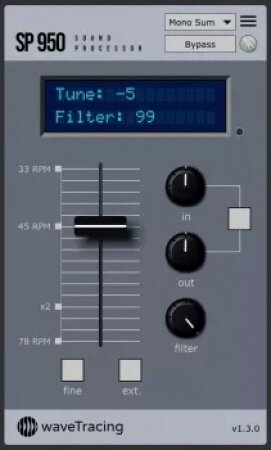
Accurate emulation of the SP's 12-bit 26.04kHz ADC, DAC and detune. Gritty sound with mandatory aliasing artifacts.
Features
SP sound for E-mu SP-1200 lovers *
Akai S950 filter emulation *
Combined RPM/detune slider
Actual pitch remains unchanged
HiDPI / Retina support, resizable UI
No hassle registration (serial)
Free updates
VST3 / AU effect plugin
Windows/Mac with native M1/M2 support
The sound
Accurate emulation of the SP's 12-bit 26.04kHz ADC, DAC and detune. Gritty sound with mandatory aliasing artifacts.
Detune
If you are familiar with the E-mu SP-1200* workflow, you know the way the device is typically used is with a pitched-up source such as a turntable playing a LP record at 45RPM or 78RPM, and a detune after sampling in the SP-1200* to get back to the original pitch and duration. This was initially done to save sampling time, but the resulting artifacts soon became the signature of the device, and of whole musical trend.
This is exactly what the SP950 effect plugin intends to reproduce in a single slider: the RPM/detune slider combines the pitch of the source (markings on the left side, in RPM relative to 33 and in factors) with the detune of the SP (semitons value on the LCD) to compensate each other. The result is a constant duration and pitch output, with varying detune aliasing and bandwidth artifacts.
Please note: actual pitch remains unchanged.
ext. switch extends the detune range from -15 semitons to -30 semitons
fine switch changes detune steps from semitons to tenths of semitons
Filter
Another well-known workflow is the combination of the SP and an Akai* S950 low-pass filter to isolate a bass line. The digitally-controlled analog 6th-order Butterworth low-pass filter of the Akai* S950 is reproduced here for that purpose, as well as the possibility to mitigate some high-frequency detune artifacts.
The filter can be set from 0 to 99 like in the original S950. The filter is defeated when set to 99 (bypass).
Gain
Gain in and gain out can be set from -12dB to +12dB, in 0.1dB increments. This can be used to adjust levels based on a given correction, but can can also used to either clip the input section, or keep some margin to increase noise.
link switch maintains a constant total gain when modifying gain in
Total gain can still be modified while link is active by modifying gain out
Total gain is maintained within each gain knob limits (eg +24dB can not be maintained when gain in is lowered)
Signal Routing
The routing section located in the plugin's header operates on the signal flow.
In addition to dry/wet and bypass functions, a layout selection menu let you define the way the input signal is converted and processed, to wit.
WaveTracing SP950 v. 1.3.0 WiN VST3 [MOCHA] screenshotLayout selection has no impact on mono signals, except for the Stereo Side option which is equivalent to a bypass in this case
The Stereo L/R/Mid/Side layout options only affect one component of the signal leaving the other untouched. You can choose to chain a second instances of the plugin to process the complementary component with a different set of parameters
The wet/dry knob is positionned after the layout selection in the signal flow, so the dry signal is also affected in case of a mono conversion
bypass button is equivalent to 0% wet
Interface
The minimalist interface is fully compatible with HiDPI/Retina displays for crisp rendering. It can be resized (zoomed in or out) unsing the menu in the upper right corner. The LCD color scheme can be chosen among 6 presets using the small button on the right of the LCD.
Zoom selection affects all instances of the plugin on a given machine and is automatically reflected on running instances
Beside aesthetic considerations, LCD color selection can be used as a visual clue to differentiate multiple plugin instances inside a project
Ableton users running a HiDPI display on Windows might want to unselect the "Auto-Scale Plug-In Window" option in Ableton's right-click menu to get a crisp rendering
Home page
DOWNLOAD
